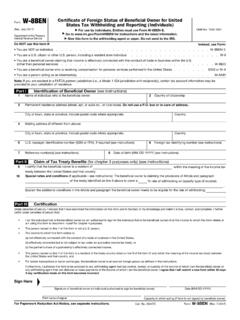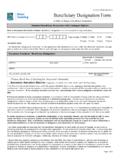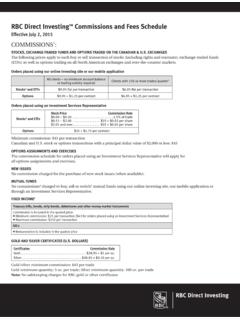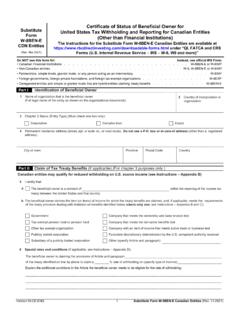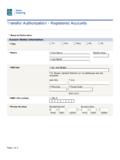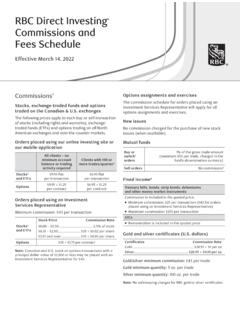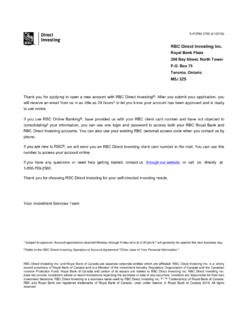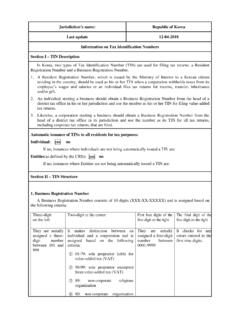Transcription of Declaration of Tax Residence for Individuals – Part XIX of ...
1 Protected B when completedDeclaration of Tax Residence for Individuals Part XIX of the Income Tax ActFill out all sections of this form that apply to you and give it to your financial institution. Canadian financial institutions have to collect the information you give on this form to open and maintain a financial account. Each account holder of a joint account has to fill out a Declaration of tax Residence . If you need help to determine your tax residency, see Income Tax Folio, S5-F1-C1: Determining an Individual s Residence Status, at For more information, see "General Information" and "How to Fill Out the Form" on page 1 identification of account holder Last name First name and initial(s)Date of birth Year Month DaySocial insurance numberPolicy/account number assigned by the financial institutionPermanent Residence addressApartment number street number and nameCityProvince, territory, state, or sub-entityCountry or jurisdictionPostal or ZIP codeMailing address (only if different from the permanent Residence address)
2 Apartment number street number and nameCityProvince, territory, state, or sub-entityCountry or jurisdictionPostal or ZIP codeSection 2 Declaration of tax residenceTick ( ) all of the options that apply to am a tax resident of am a tax resident of a jurisdiction other than Canada. If you ticked this box, give your jurisdictions of tax Residence and taxpayer identification numbers (TIN) or functional you do not have a TIN or functional equivalent for a specific jurisdiction, give the reason using one of these choices:Reason 1: I will apply or have applied for a TIN but have not yet received itReason 2: My jurisdiction of tax Residence does not issue TINs to its residentsReason 3: Other reason, please specify: Jurisdiction of tax residenceTaxpayer identification numberReasonSection 3 CertificationI certify that the information given on this form is correct and complete.
3 I will give my financial institution a new form within 30 days of any change in circumstances that causes the information on this form to become incomplete or (print name of signer)Signature (account holder or authorized person) Date (YYYY-MM-DD) Personal information (including the SIN) is collected for the purposes of the administration or enforcement of the Income Tax Act and related programs and activities such as administering tax, benefits, audit, compliance, and collection. Personal information may be shared for purposes of other federal acts that provide for the imposition and collection of a tax or duty. Personal information may also be shared with other federal, provincial, territorial or foreign government institutions to the extent authorized by law.
4 Failure to provide this information may result in interest payable, penalties or other actions. The social insurance number and taxpayer identification number are collected under sections 237 and 281 of the Act and Article 2 of the Intergovernmental Agreement between Canada and the and are used for identification purposes. Under the Privacy Act, Individuals have the right to access their personal information, request correction, or file a complaint to the Privacy Commissioner of Canada regarding the handling of the individual s personal information. Refer to Personal Information Bank CRA PPU 047 on Info Source at RC520 E (20) (Ce formulaire est disponible en fran ais.)
5 Page 1 of 3 Protected B when completedGeneral InformationFinancial accounts held by non-resident Individuals have to be reported to the CRA. Account information reported to the CRA is shared with the government of a foreign jurisdiction in which an individual is a resident for tax purposes when Canada has an information exchange agreement with that jurisdiction. To find out if an institution reported your account information to the CRA and what information the institution gave, you may ask the institution. To find out if your information has been shared with another jurisdiction, you can contact the to fill out the formSection 1 identification of account holderUse Section 1 to identify the account holder.
6 Sometimes the account holder s address may be different from the mailing address. If this is the case, give both account holder is the person listed or identified as the holder of the financial account by the financial institution that maintains the account. But, when a person other than a financial institution holds a financial account for the benefit of or for another person as an agent, custodian, nominee, signatory, investment advisor, or intermediary, they are not considered the account holder. In such cases, the account holder is the person for whom the account is a trust or an estate is listed as the holder of a financial account, the trust or the estate is the account holder, not the trustee or the liquidator.
7 Similarly, if a partnership is listed as the holder of a financial account, the partnership is the account holder, not the partners in the partnership. In such cases, fill out Form RC521, Declaration of Tax Residence for Entities Part XIX of the Income Tax account holder also includes any person who can access the cash value or designate a beneficiary under a cash value insurance contract or an annuity social insurance number (SIN) of the account holder only has to be reported on this form if the account holder has a SIN and is a a financial account is opened by or for a child, and the child is considered the account holder, the parent or the legal guardian can fill out and sign the form for the policy/account number is the number the financial institution assigned to your account (such as a bank account number or insurance policy number ).
8 When this form is completed for a controlling person of an entity, enter the policy or account number assigned to the entity's account. If there is no such number , leave this box 2 Declaration of tax residenceUse Section 2 to identify the account holder s tax Residence and taxpayer identification number . If the account holder does not have such a number , give the , an individual will be a tax resident of a jurisdiction if they normally reside in that jurisdiction and not just because they receive income from that jurisdiction. Except for the , your citizenship or your place of birth does not determine your tax individual who is a tax resident in more than one jurisdiction can rely on any tiebreaker rules (when they apply) in a tax convention to resolve a case of dual tax Residence .
9 Otherwise, an individual should enter all of the jurisdictions where they are a tax resident and provide their taxpayer identification number (TIN) for each more information on tax residency, talk to a tax adviser or go to /tax-residency/# taxpayer identification number or functional equivalent, often referred to by its abbreviation TIN, is a unique identifier made of letters or numbers that a jurisdiction assigns to an individual. The jurisdiction uses the TIN in administering its tax laws to identify the individual. Enter the TIN in its official format . For more details about acceptable TINs, go to -exchange/crs-implementation-and-assista nce/tax- identification -numbers /# If you are a resident of the and do not have a TIN from that country, you have 90 days to apply for one and 15 days after you receive it to give it to your financial institution.
10 If you fail to provide your TIN to your financial institution, you are liable to a $100 penalty. If you are not a resident of Canada or the and do not have a TIN from your jurisdiction of Residence , you have 90 days to apply for one and 15 days after you receive it to give it to your financial institution, unless your jurisdiction of Residence does not issue a TIN or require the collection of TINs. If you do not have a TIN, you have to provide a reason for not having one. Reasons that fall under "Reason 3: Other reason" for not having a TIN include not being eligible to receive one. However, if you are eligible to receive a TIN and fail to provide one to your financial institution, you are liable to a $500 penalty.
